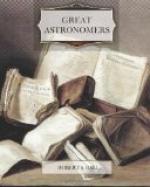The year 1678 found him in the full tide of work in his observatory. He was specially engaged on the problem of the earth’s motion, which he sought to derive from observations of the sun and of Venus. But this, as well as many other astronomical researches which he undertook, were only subsidiary to that which he made the main task of his life, namely, the formation of a catalogue of fixed stars. At the time when Flamsteed commenced his career, the only available catalogue of fixed stars was that of Tycho Brahe. This work had been published at the commencement of the seventeenth century, and it contained about a thousand stars. The positions assigned to these stars, though obtained with wonderful skill, considering the many difficulties under which Tycho laboured, were quite inaccurate when judged by our modern standards. Tycho’s instruments were necessarily most rudely divided, and he had, of course, no telescopes to aid him. Consequently it was merely by a process of sighting that he could obtain the places of the stars. It must further be remembered that Tycho had no clocks, and no micrometers. He had, indeed, but little correct knowledge of the motions of the heavenly bodies to guide him. To determine the longitudes of a few principal stars he conceived the ingenious idea of measuring by day the position of Venus with respect to the sun, an observation which the exceptional brightness of this planet rendered possible without telescopic aid, and then by night he observed the position of Venus with regard to the stars.
It has been well remarked by Mr. Baily, in his introduction to the “British Catalogue of Stars,” that “Flamsteed’s observations, by a fortunate combination of circumstances, commenced a new and a brilliant era. It happened that, at that period, the powerful mind of Newton was directed to this subject; a friendly intercourse then existed between these two distinguished characters; and thus the first observations that could lay any claim to accuracy were at once brought in aid of those deep researches in which our illustrious geometer was then engaged. The first edition of the `Principia’ bears testimony to the assistance afforded by Flamsteed to Newton in these inquiries; although the former considers that the acknowledgment is not so ample as it ought to have been.”
Although Flamsteed’s observations can hardly be said to possess the accuracy of those made in more recent times, when instruments so much superior to his have been available, yet they possess an interest of a special kind from their very antiquity. This circumstance renders them of particular importance to the astronomer, inasmuch as they are calculated to throw light on the proper motions of the stars. Flamsteed’s work may, indeed, be regarded as the origin of all subsequent catalogues, and the nomenclature which he adopted, though in some respects it can hardly be said to be very defensible, is, nevertheless, that




